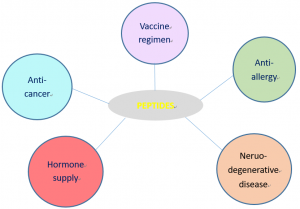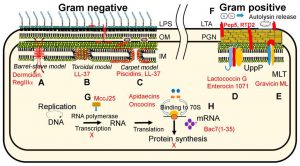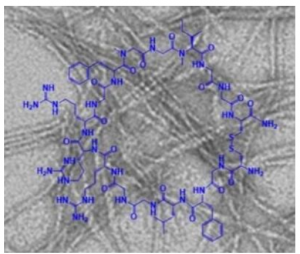- Scientists are expected to develop a new type of cellular permeable peptide chimera to promote wound healing.
In recent years, cell penetrating peptides as drug delivery carriers have aroused great interest among scientists. They may help develop new therapeutic agents or cosmetics. In general, compounds with a molecular weight greater than 500Da can hardly pass through the biofilm. In a recent study, researchers covalently combined a sequence that promotes wound healing with cellular osmotic peptides to improve the efficiency of drug transport in cell membranes. The new peptides ingested by cells can be conjugated into keratin cells, which can significantly improve drug transport under good tolerance.
- AJP: Intestinal peptide is helpful to improve the success rate of corneal transplantation.
A recent article published in the journal American Journal of Pathology found for the first time that injecting neuropeptide (VIP), into the eyes of mice could improve the success rate of corneal transplantation. VIP also has other advantages, such as accelerating wound healing, protecting corneal endothelial cells and improving the cleanliness of corneal transplantation. If the treatment is approved, it will help solve the problems of many patients with corneal diseases.
- Cancer Cell: Scientists develop peptide drugs for accurate treatment of prostate cancer.
In a new study recently published in the international academic journal Cancer Cell, researchers from the University of Michigan developed a new treatment strategy that targets genetic mutations in about half of prostate cancer. When the two genes, TMPRSS2 and ERG, are relocated and fused on chromosomes, prostate cancer development is turned on. However, the development of small molecule inhibitors targeting ERG has always been a great challenge.
- Nature journal: Magic peptides that can effectively deal with drug-resistant bacteria.
Worldwide abuse of antibiotics has received a lot of attention recently. As a result of excessive use of antibiotics, more and more bacteria have developed drug resistance, resulting in the emergence of “superbugs”. At the same time, the development of new antibiotics has not been able to keep pace with the evolution of bacteria. According to the World Health Organization, 10 million people could die of drug-resistant bacteria each year by 2050. In order to update the arsenal of weapons to deal with bacteria, some scientists have taken different measures. Recently, researchers from the Massachusetts Institute of Technology, the University of Brasilia and the University of British Columbia in Canada have designed an antibacterial peptide that can destroy many kinds of bacteria, including drug-resistant bacteria. The results were published in the journal Scientific Reports.
- Tuberculosis: Specific peptides from fungi are expected to treat tuberculosis.
In a recent study published in the international journal Tuberculosis, scientists from Lund University found that. A special peptide isolated from saprophytic ascomycetes (Pseudoplectania nigrella) is expected to be used as a new antibiotic to inhibit the growth of Mycobacterium tuberculosis.
- Hypertension: Peptides in spirulina may have obvious antihypertensive effect.
In a recent study published in the international journal Hypertension, scientists from institutions such as the University of Rome said that a peptide extracted from spirulina may be able to fight high blood pressure by dilating blood vessels. The results are expected to help researchers develop new treatments for hypertension at a later stage.
- Ang Chem Int Ed: scientists have developed new macrocyclic peptides that are expected to treat Alzheimer’s disease and type 2 diabetes.
At present, researchers have not developed effective treatments to resist the formation of amyloid protein in patients with Alzheimer’s disease and type 2 diabetes mellitus. Recently, scientists from the Technical University of Munich have found a solution by describing a new macrocyclic peptide molecule that can effectively inhibit the formation of amyloid proteins. The study was published in the international journal Angewandte Chemie International Edition.
- Diabetes: Natural peptides may improve glucose and insulin sensitivity and reduce body weight.
In a recent study published in the international journal Diabetes, researchers from the University of California found that obese mice were treated with peptides naturally found in the body called catechol somatostatin (CST). Or can significantly improve the level of glucose and insulin tolerance in mice, but also reduce the body weight of mice. The researchers point out that CST plays a key role in the recruitment and function of macrophages in the liver, as well as in regulating obesity-related liver inflammation and insulin tolerance.
- PLoS ONE: novel peptides can kill neuroma cells by blocking DNA replication.
Neurocytoma is one of the cancers that cause childhood death, accounting for 15% of childhood cancer deaths, and the 5-year survival time of high-risk neuroma patients is often 40% to 50%. Recently, in a research paper published in the international journal PLoS ONE, researchers found that a peptide called R9-caPep can target neuroma cells. It destroys the proliferation of nuclear antigen (PCNA) to kill neurocytoma cells. PCNA is an essential protein for DNA synthesis, replication and repair of neuroma cells.
- Immunity: A host defense peptide in frog mucus can kill many influenza virus strains.
Frog mucus contains molecules that kill bacteria and viruses, and scientists are beginning to study its use as a potential source of a new antimicrobial drug. In a new study, researchers from Emory University, Mount Sinai Icahn Medical School and the Rajiv-Gandhi Biotechnology Center in India reported that in Hydrophylax bahuvistara, a brightly colored tennis-sized frog species in southern India, A host defense peptide can eliminate a variety of influenza virus strains. The researchers named the newly identified peptide “urumin,” and the results are published in the journal Immunity.


